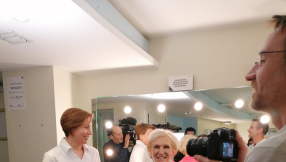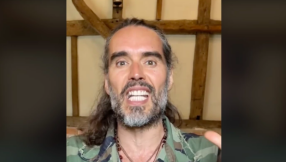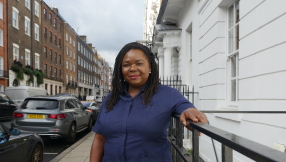Sri Lanka's 'forgotten war': A call for global church advocacy
For several years, a civil war in Sri Lanka has placed in opposition a government dominated by the Sinhalese majority population and rebels who claim to defend the rights of the Tamil minority. Defenders of human rights protest that this war is being fought at the expense of the civilian population, with displaced people detained in camps that fail to provide for their basic needs, children abducted for recruitment as soldiers, and other inhabitants of combat zones being used as human shields by the rebels.
Representatives of churches, ecumenical groupings and non-governmental organisations discussed Sri Lanka's ethnic conflict at a session of the 4th annual United Nations Advocacy Week sponsored by the World Council of Churches (WCC) and held in New York City this week.
Rohan Edirisinha, a Sri Lankan Anglican layman, presented prospects for a negotiated political settlement. According to Edirisinha, who is a former chairperson of the Commission for Justice and Peace of the National Christian Council in Sri Lanka, the militaristic approach of the current government, focusing on a defeat of Tamil rebel forces on the battlefield, creates doubts regarding the actual chances for a settlement.
The domestic political discourse, Edirisinha said, glorifies the military and centres on the defeat of rebel forces and the reconquest of areas controlled by them. As a constitutional law expert, he argued that "a federal constitution with [safeguards for] devolution of power, and which combines shared rule with self-rule, should be the basis of a just political solution to Sri Lanka's current war".
Former Norwegian Prime Minister Kjell Bondevik, who moderated the session, affirmed the churches' responsibility in advocating for a negotiated solution. Bondevik's government brokered a ceasefire in Sri Lanka in 2002, which was completely abandoned last January after repeated violations by both parties. Currently, Bondevik is the moderator of the WCC Commission of the Churches on International Affairs.
Christians make up 9 per cent of Sri Lanka's 19 million population. They are the only religious community which bridges the ethnic divide between the Sinhalese-speaking, predominantly Buddhist majority and the predominantly Hindu Tamils.
Church unity is of particular importance to the Christian witness for peace in Sri Lanka. A variety of denominations resulting from several missionary waves, some of them connected to former colonial powers Portugal, the Netherlands and Britain, are present in the country. If the churches fail to speak with one voice, their testimony loses its force.
Ecumenical solidarity in the region and beyond
Solidarity with the Sri Lankan people was expressed at the New York event by church representatives from all over the world.
Jochen Motte, of United Evangelical Mission in Germany, shared his impressions from a recent visit to Jaffna. In the highly militarised area in the north, civilians are suffering because of restrictions imposed by the army, he said.
"Fishermen are lucky if they get a permit to go out fishing once or twice a week, but even then they must stay within a two-kilometre range, or else they may be shot by the soldiers."
Canon Grace Kaiso, of the Uganda Joint Christian Council, advised the Sri Lankan churches to "be consistent in [their] call for a negotiated, non-military solution. For 15 years we [in Uganda] sang this same song, and finally we succeeded."
Sri Lankan government measures such as special identity cards for Tamils – which bring charges of discrimination – as well as the underlying ideology of racial supremacy evoke terrible memories for veterans of the struggle against apartheid. But as South Africa has trade relations with Sri Lanka, they see this connection as a possible opening for advocacy.
The need to report human rights violations to UN bodies and to governments, especially in the global south, was identified as a priority for church advocacy on behalf of Sri Lanka. While Western countries have lost clout with the government of Sri Lanka, criticism by countries that have gone through similar challenges could be particularly meaningful.
Among the advocacy objectives that came up during the discussions were suggestions concerning appropriate demobilisation procedures for child soldiers, who currently end up in prison when captured, and a call for the UN working group on Sri Lanka to visit the country and get first-hand knowledge of the situation.













